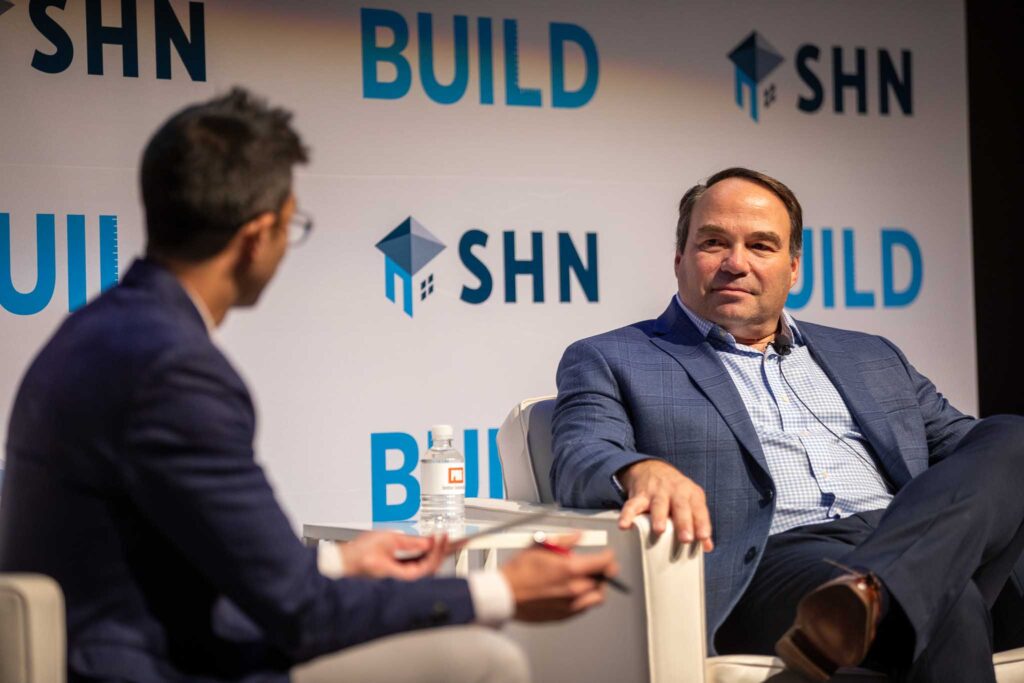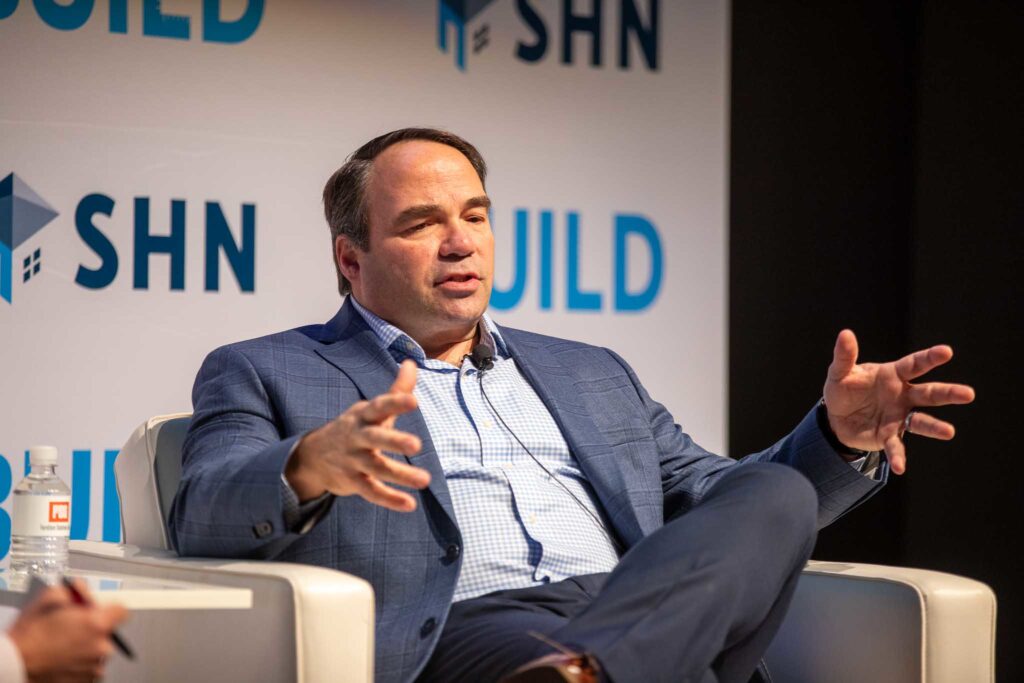Discovery Senior Living is catering to the evolving preferences of the incoming baby boomer generation with a new brand of experience-focused communities called Choreograph.
As planned, Choreograph communities will focus on experiences it can curate for residents. For example, the Bonita Springs, Florida-based company is opening a new community near the University of Florida in Gainesville to give residents the full experience of living in “gator country.”
In Daytona Beach, the company is planning another community that will deliver a “vibe that is a little racetrack and a little beachy,” according to CEO Richard Hutchinson.
The two communities fit into Hutchinson’s philosophy that, as the boomers age, they will desire to live in communities in “lifestyle centers” that can deliver location-driven experiences and wellness rather than simply health care.
“The baby boomer generation made it pretty simple and clear that it’s about experiences,” Hutchinson said during a discussion at the recent 2022 Senior Housing News BUILD conference in Chicago.
In a nutshell, Hutchinson said the new brand is meant to “choreograph, customize the lifestyle [residents] want.” His goal is to attract residents seeking specific, sometimes niche, ways of living; and then provide to residents as many unique experiences as possible.
Looking ahead, Discovery is adopting the Choreograph brand for all of its experiential living communities.
Choreograph represents just one part of Discovery’s development pipeline and overall growth, and the operator also is working on some community expansions beyond the new brand. In October, the company announced a new recapitalization with Coastwood Senior Housing Partners and Lee Equity Partners in an effort to address the big challenges and opportunities Hutchinson sees in play at the end of 2022
“Everyone is leaning into the change in evolution … those that don’t, probably won’t be in the industry five years from now,” Hutchinson said. “I’m tired of saying that this industry needs to catch up to others. I think we are wonderfully positioned to flip that script.”
 Photo by Robotoaster for AMN
Photo by Robotoaster for AMNChoreographed experiences
While all of Discovery’s experiential living communities will all operate under the Choreograph brand, that doesn’t mean they will be identical to one another — far from it, Hutchinson said.
Instead of offering a one-size-fits-all experience under a national platform, Discovery’s Choreograph communities will offer experiences based on the “vibes” of the local market. As noted, a resident might want to relive their days as a University of Florida gator in Gainesville; or enjoy the amenities of the forthcoming One Daytona mixed-use redevelopment, which has been described as “an irresistible getaway for race fans.”
“[The communities] will be different not only in the build itself, but also in its location and feel,” Hutchinson said. It will be a customized experience.”
The idea of creating experiential senior living dates back to the aftermath of the Great Recession, a time when Hutchinson said the industry lost touch with younger residents between the ages of 70 and 75.
“I’ve always lamented that, as this inflection of a new generation is coming through with the baby boomers, it made a ton of sense for us to reconnect with that group,” Hutchinson said.
In an effort to better connect with the demographic, Discovery began working with Brand Verve, a brand strategy and insights firm that in addition to operators like Sunrise Senior Living works with such hospitality clients as Loews Hotels, Marriott and Hampton by Hilton.
The goal was to investigate the market with an open mind and collect data, rather than basing any future strategy on purely anecdotal evidence, Hutchinson said.
What they found is that residents want experiences based on not geographies or regions, but “destinations” like the University of Florida or the Daytona International Speedway.
Hutchinson added: “The other big thing about the experience is that you can market it differently.”
As far as locations go, Discovery is planning on scaling up in “lifestyle centers” where many different kinds of people mingle in spaces such as retail shops, hotels and restaurants.
The advantage of building in these lifestyle centers is that intergenerational and other custom programming fits into the operations like a key into a lock, according to Hutchinson.
Helping to fill out that experiential living model is technology that allows residents to get what they want, when they want it, such as DoorDash. Using such an approach can not only increase resident satisfaction but also lessen the staffing burden on a community.
“You bring services in and out in a very transparent and seamless way,” Hutchinson said. “For example, we have a rooftop bar, but it’s also designed to be a pop-up restaurant area. So, we can literally take the P.F. Chang’s down the road and bring them in and have a pop-up experience.”
‘Embrace the evolution’
As this industry has evolved over the years, Hutchinson sees some “settled-in” bad habits that he thinks the industry can change. For example, high turnover rates among community associates have become commonplace over the years.
But Hutchinson thinks that is unacceptable and is working to change how the industry thinks about labor. Discovery’s capital and ownership partners are on board and willing to “embrace the evolution” by helping to finance it. They include Welltower (NYSE: WELL), Ventas (NYSE: VTR), National Health Investors (NYSE: NHI), Kayne Anderson, White Oak and Lonestar.
One of the company’s ongoing evolutions is finding a way to break the industry’s current staffing paradigm. For example, Hutchinson said he is of the mind that the industry must “stop with the guilt, and realize that we’ve got to compensate our people better.”
That’s why the company is forging ahead with a new certification infrastructure that will create a framework to increase pay as more educational benchmarks are achieved. Currently, the program is referred to as Discovery University, though that could change in the future..
“We’re going to start credentialing our employees so that they can get pay raises as they are credentialed into different education levels,” Hutchinson said. “It’s a retention tool because your executive directors are really important — you’d like them to stay there. But … how do you compensate them?”
In addition to finding ways to boost worker pay, those participating in the Discovery University program will create opportunities to advance in their senior living careers. The larger idea is to create a sense of ownership in the operations of a community, Hutchinson said
But Hutchinson doesn’t just want to create a sense of ownership. Instead, he wants executive directors to benefit from the communities’ success as if they were an owner.
“All of my communities over the next couple of years will move toward executive directors receiving some of the value creation in a form or another, that is more akin to ownership,” Hutchinson said. “The folks on site, they create a lot of value, they should participate in that.”
Looking ahead, Hutchinson sees a real need for others in the industry to do the same thing and to get on board with more efforts such as the one he is undertaking at Discovery. To him, that is a process that should start with capital and ownership.
“There needs to be a bigger focus now with sophisticated capital coming in and putting the pressure on really running these business processes in a sophisticated manner,” he said. “Rather than simply saying, ‘Oh, this person doesn’t understand this. Let me take them and move them along and find someone that does.’”
Companies featured in this article:
Discovery Senior Living, NHI, Sunrise Senior Living, Ventas, Welltower


